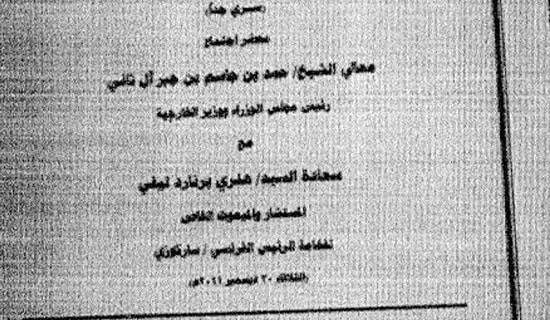In the run-up to Christmas, and with the appearance of Christmas trees and Christmas decorations at places of business across Qatar as well as Christmas parties and events at hotels in the country,[1] Qataris began debating questions that come up in the Muslim world every year: Should public expressions of Christmas be permitted, and should Muslims wish Christians a happy holiday?[2] It should be noted that Qatar has a significant Christian population, primarily foreign workers and businessmen, as well as considerable tourism during the holiday season.
The debate unfolded on social media and in the Qatari press, particularly in the Al-Sharq daily. Some writers opposed any public festivities, arguing that they were inappropriate because they include customs forbidden and considered sinful in Islam – for example, "licentious" New Year's Eve parties – and because they represent foreign Western culture that could attract young people. Others criticized business owners and hotels for encouraging these celebrations, and government officials, particularly the Ministry of Religious Endowments, for allowing them.
On the other hand, some writers called for respecting the principle of coexistence and religious tolerance and for wishing Christians happy holidays, with the aim of establishing respectful and neighborly relations with Christians and members of other religions living in Qatar.
It is notable that several weeks previously, private schools in Qatar that celebrated Halloween were criticized, and the Qatari press reported that the Education Ministry had banned any such celebrations and had even warned that schools defying the ban would be penalized.[3]
The following is a translation of excerpts from articles in the Qatari press on the subject:

Christmas event at a Doha hotel in 2015 (image: dohanews.co, November 16, 2016)
Columnists Opposing Celebrating Christian Holidays In Qatar: Promulgating A Foreign Culture Is Against Islam
Some columnists wrote that Qataris must beware of the infiltration and promulgation in Qatari society of a foreign culture and of activity that is against Islam:
Qatari Education Ministry Advisor: Christians Must Respect Us – And Not Publicize Their "Licentious" Celebrations
Rashed Al-'Awda Al-Fadli, Education Ministry advisor and columnist for Al-Sharq, wrote that Christians are entitled to mark their holidays in their own homes, but must respect the Muslims and Qatar's laws, and not publicize their celebrations. He said that these celebrations include "shameless and repellent" dancing and activity that is sinful and "licentious," and that it could even tempt young Muslims to join in. He wrote:
"We, the citizens and residents of our good land Qatar, live together in this generous homeland; we share rights and responsibilities; and we cooperate so as to actualize the public interest for the benefit of us all. When we [Muslims] celebrate our holidays... we do not demand that members of other religions celebrate our holidays, and we are not angry if they do not wish us happy holiday on these and [other] joyful occasions. [Likewise], when we travel to their lands, or live [there] alongside them, we do not promulgate our celebrations in the hotels, tourism and shopping centers, or in their neighborhoods, and we do not make noise or disturb their rest in any way – out of respect and out of our obligation to follow the law and observe the customary [public] order there.
"[By the same token, Christians living in our lands] are not obligated to adopt our religion... but they must respect our belief and the laws of our land, and our general constitution, in all things regarding holidays and celebrating them – particularly [by not] spreading a Christmas and New Year's atmosphere, and not setting up, in hotels, at tourism sites, and in shopping centers, statues, crosses, and symbols that are against our religion and our beliefs. These activities, that go along with these celebrations, are against the precepts of us Muslims' religion, and against our moral and social principles...
"Is it fitting to associate Jesus with calls to [allow] the mixing of men and women in nocturnal feasts and shameful and licentious dances, and with the drinking of wine and the eating of non-halal meat... while listening to loud rhythmic music from midnight to dawn in sinful feasts and parties? How can the managements of our hotels allow holding these parties [that] spread an atmosphere that is alien to our society and which tempt young people to fall into these dens of licentiousness? We should condemn the businesses that rush to take advantage of Christmas and New Year as the busiest season for making profits without giving a thought to religious and moral considerations...
"With regard to such celebrations in homes and in venues for their private gatherings, that is their affair, and we need not judge their actions or greet them with wishes and blessings for Christmas or the Christian New Year. At the same time, we must make sure that their rights are guaranteed, and must assure that they are provided conditions of dignified living, within the framework of mutual respect and cooperation..."[4]
SUPPORT OUR WORK

Qatari Columnist: Allowing Public Christmas Celebrations Is An Oversight On The Part Of The Qatari Authorities
Similarly, 'Aisha 'Obeidan, another Al-Sharq columnist, criticized Christmas celebrations in Qatar's public space, arguing that they are against Islam and foreign to Muslim society. Accusing the Ministry of Religious Endowments and the Qatari authorities of doing nothing to stop them, she wrote:
"As openness prevails in our society, with all its negative and positive aspects, Westernization is also spreading, in thought, culture, and behavior, causing activity that is against our religion, values, and ethics, to infiltrate [our culture, and causing us] to adopt the religious, social, and ideological traditions of the other... The Islamic identity, with its values, has been removed from the human identity, with all its elements. Thus, we are actualizing the warning of the Prophet [Muhammad] regarding the [Islamic] ummah's imitation of innovations, deviation from tradition, and following of the whims of the nations that preceded [Islam]...
"And lo, today we see [the actualization] of our Prophet's warning: This year, Qatari society was witness to a complete holiday atmosphere at the close of the current civil year, 2018... [with] displays of garish red decorations announcing the approach of Christmas. Images of Santa Claus and lighted Christmas trees spread throughout most shopping malls, and infiltrated the hotels and places of business and the foreign schools.
"Anyone seeing these sights, in such a complete way, felt that he was in a foreign Christian country. This is in addition to what is happening in the closed venues, in particular in the hotels: dancing, singing, and [drinking] alcohol till dawn... This phenomenon existed in the past [as well], but [only] inside homes, in secret, and in limited scope... [At that time,] there were those who condemned it, those who prevented it, and those who objected when the buds [of this phenomenon] appeared. [But] now, with [today's] social openness, these objections have disappeared, allowing many residents in a society of diverse religions, cultures, and views to conduct their customs, rituals, and beliefs completely undisturbed and in public, and with the knowledge of those in charge and of the decision-makers...
"But how far [will this go?]!! Where is the Ministry of Religious Endowments, and who can put an end to this annual phenomenon that sparkles more brightly every year, and who can limit its manifestations? What are the authorities in the Education Ministry doing about these celebrations in the foreign private schools, before it becomes an annual custom anticipated by pupils and children eagerly anticipating gifts brought by Santa Claus?...
"We are neither pro-[Christian] nor anti-[Christian] when it comes to how they conduct their religious rituals. [But we] condemn the spread of their public celebrations in the space of our Muslim society, across all its areas and its shopping centers, and in all its hotels and foreign schools -while none of our officials in relevant [positions] in the country [does anything to] stop this spread."[5]
Columnists In Favor Of Celebrating Christian Holidays In Qatar: We Must Show Religious Tolerance
Other columnists spoke out against fatwas forbidding Muslims to wish Christians happy holidays, which are issued from time to time in the Muslim world, and called for religious tolerance and openness towards non-Muslims, out of compassion, mercy, and humanism:
Columnist: We Have Failed "To Create An Individual Capable Of Living In Peace Alongside The Other"
Qatari journalist 'Abd Al-'Aziz bin Muhammad Al-Khatir condemned the fatwas prohibiting Muslims from wishing Christians a happy holiday, stating that this is a manifestation of Muslim society's failure to accept and coexist with the other. He called for promoting a humanist Muslim culture that sees others, whatever their religion, as fellow humans. He wrote:
"I wish our Christian brothers, in this country and abroad, Merry Christmas and Happy New Year. As school pupils, we would customarily and naturally wish our Arab Christian brothers happy holidays, from a purely human standpoint, based on the rationale of coexistence imposed [on us] by life and circumstances, and in a belief in freedom of religion. I do not find today a convincing reason for calling for prohibiting this custom and of defining it as apostasy.
"Wishing [others a happy holiday] expresses recognition of the existence of the other – not of what he believes. This wish expresses recognition of his right [to acknowledgement] by the society in which he lives, just as it is our right [to expect from him best] wishes for our own holidays, and respect for our religious beliefs. In my view, the many fatwas banning doing so cause great confusion between religion and culture. Wishing [others a happy holiday] is based on the cultural dimension of society, not on a person's religion...
"Coming out as one, as witnessed on social media, against anyone who wishes our Christian brothers a merry Christmas unveils the illusion [we maintain regarding] the progress in our Gulf society, of which we are so proud – and which has [in fact] not succeeded in creating an individual capable of living in peace alongside the other, and that will without a doubt create an individual incapable of living [even] alongside a coreligionist...
"I call for a humanist Muslim society that sees the other as a [fellow] man for all purposes, whatever his religion. In our society today there is a gamut of religions – everywhere there are Christians, Buddhists, Hindus, and others. How, then, will we be able to live alongside them as Muslims? I do not mean by sharing [their] rituals, but by using the language of coexistence... If we ban simple, verbal good wishes, what will remain of society's humanism – except for increased shifts towards division and disintegration[?!]"[6]
Qatari Liberal: Islam Allows Wishing Non-Muslims A Happy Holiday; We Must Show Openness Towards Them
Qatari liberal 'Abd Al-Hamid Al-Ansari, a columnist for the Al-Watan daily, wrote that those who ban wishing non-Muslims a happy holiday are extremists who forbid what Islam does not forbid, and that the Gulf countries, especially Qatar, which are home to many non-Muslims, must cultivate a spirit of tolerance: "At a time when the entire world is celebrating Christmas and New Year, and is filled with an atmosphere of joy and good wishes for the new year, the Friday preachers [in our mosques], as well as citizens who have succumbed to religious extremism [and write on] social media, warn [people] against wishing the non-Muslims... merry Christmas and participating in their celebrations, on the grounds that the religion [of Islam] forbids this. Such discourse, which fuels hatred and creates psychological, social and religious barriers [between people], still recurs every year in our Gulf societies...
"Do the claims of these extremists have any genuine religious basis? Does Islam [really] forbid to extend holiday greetings to non-Muslims or participate in their celebrations?... The truth is that [these extremists] forbid what [Islam] permits, and are unnecessarily strict. Excessive prohibitions are not the way of Islam...
"The Muslims' relations with non-Muslims are based on compassion, charity, mutual ties and peaceful coexistence. For the Gulf [countries], which throughout history have shown openness towards others without complexes of arrogance or hatred, such benign relations with the non-Muslim residents, who form the majority [in these countries], is especially natural. Qatar, which is preparing to host the World Cup [in 2022] and welcome [visitors from] all over the world, [must treat] the creation of a friendly atmosphere and the spreading of religious tolerance as a top priority, and the religious figures in the Gulf should become more open towards others and wish them [a happy holiday], so as to highlight the virtues of Islam..."[7]
[1] See e.g., Doha.anantara.ae.
[2] See MEMRI Inquiry and Analysis No. 964, In Advance Of Orthodox Easter In Egypt, Muslim Brotherhood And Salafis Issue Fatwas Forbidding Greeting Copts On Their Holidays, May 6, 2013; MEMRI Special Dispatch No. 5577, Saudi Author: Nothing Wrong With Muslims Joining Christmas Celebrations, December 26, 2013.
[3] Al-Sharq (Qatar), November 1, 2018.
[4] Al-Sharq (Qatar), December 25, 2018.
[5] Al-Sharq (Qatar), December 30, 2018.
[6] Al-Sharq (Qatar), December 27, 2018.
[7] Al-Watan (Qatar), December 31, 2018.




